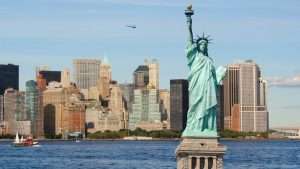The Volokh Conspiracy
Mostly law professors | Sometimes contrarian | Often libertarian | Always independent
Forbes Interview on How to Limit Presidential Power Over Immigration
In it I explain how to reform a federal law the Supreme Court has interpreted as giving the president nearly unlimited power to ban migrants from entering the United States.

In an interview with Stuart Anderson in Forbes, published today, I discuss possible strategies for limiting presidential power over immigration by reforming a federal law that the Supreme Court has interpreted as giving the president virtually unlimited power to bar potential immigrants from entering the United States. Here is an excerpt:
Section 212(f) [of the Immigration and Nationality Act]… gives the president the power to bar entry into the U.S. by any foreign national whom he deems to be "detrimental to the interests of the United States…"
The Trump administration claimed – and the Supreme Court, in Trump v. Hawaii, the travel ban decision, largely agreed – that this gives the president authority to bar the entry of almost any noncitizen for virtually any reason he wants….
[I]f Section 212(f) really does give the president virtually unlimited authority to bar noncitizens from entering the U.S. whenever he pleases, then it would run afoul of the "nondelegation" doctrine, which limits Congress' ability to delegate its powers to the executive.
Admittedly, it is often difficult to tell what qualifies as an excessive delegation. But the delegation of unlimited power to exclude any alien for any reason is surely a violation of the nondelegation principle if anything is….
If the Supreme Court is serious about nondelegation, it will eventually have to either strike down Section 212(f), interpret it more narrowly, or create what would be an ad hoc exception to nondelegation rules for immigration policy….
The best option would be to just repeal [212(f)] entirely. As Trump has shown, the power granted by the statute is ripe for egregious abuse….
Congress could [also] replace Section 212(f) with more limited authority allowing the president to bar entry only for specified reasons, such as a threat to national security or participation in organized crime or the like….
Finally, if Congress thinks the president needs the power granted by Section 212(f) to be able to take quick action in the midst of a sudden crisis, it could impose a sunset clause on exclusions imposed by the executive under Section 212. After, say, 60 days, such restrictions would automatically expire unless Congress affirmatively passes a bill to extend them. This would give the president flexibility to deal with emergencies, but also prevent him from using Section 212(f) to enact permanent immigration restrictions, as Trump has done with his travel bans.


Show Comments (22)